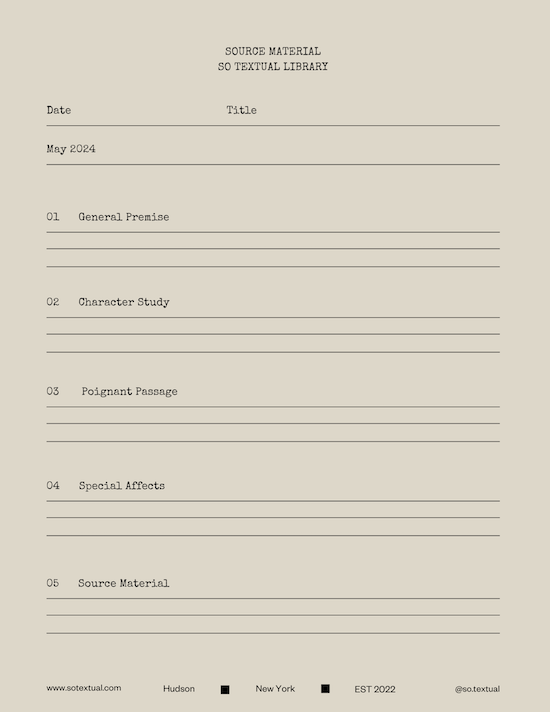SWEET DAYS OF DISCIPLINE
The Book Club Archive
There is a strange, unrelenting precision to Sweet Days of Discipline by Fleur Jaeggy. Reading it is like watching a blade being sharpened—each sentence, stark and deliberate, carves its way into your mind, leaving marks that linger long after the book is closed. In our discussion, we grappled with the novel’s restrained but haunting exploration of control, intimacy, and the desperate search for identity in the suffocating confines of a Swiss boarding school.
Jaeggy’s narrator, unnamed but vividly alive, recounts her adolescence with an icy detachment that belies the emotional intensity of her experience. At the center of the story is her relationship with Frédérique, a fellow student whose stoicism and mysterious self-possession captivate and consume her. Their connection is less a friendship than an experiment in control and surrender, desire and distance. Jaeggy writes about obsession with such quiet force that it becomes almost elemental—less an emotion and more a condition of existence.
What We Discussed
The conversation opened with Jaeggy’s prose, which left us collectively awestruck. Every sentence is razor-sharp, stripped of adornment yet brimming with tension. One member likened it to “an icicle poised to fall”—both beautiful and dangerous. The brevity of the book only heightened its power; Jaeggy wastes nothing, each word charged with meaning. We talked about how her language mirrors the emotional landscape of the story: cold, precise, and suffused with an undercurrent of violence.
The group delved deeply into the narrator’s psychology. Her obsession with Frédérique is both intense and enigmatic, driven less by love or admiration than by a desire to possess and understand. We discussed how this fixation seems rooted in the narrator’s own uncertainty about who she is. Frédérique, with her quiet strength and impenetrable demeanor, becomes a kind of mirror—one in which the narrator sees both what she desires and what she fears. This dynamic of projection and control became a focal point for our conversation.
We also explored the setting, the rigid and repressive world of the boarding school. Jaeggy’s portrayal of this environment is chilling in its austerity. The school, with its strict routines and sterile atmosphere, serves as both a backdrop and a catalyst for the narrator’s obsession. It’s a place where individuality is suppressed, where the girls are reduced to their academic performance and social decorum. We talked about how this environment heightens the narrator’s need to define herself through her relationship with Frédérique—how the school’s emptiness creates a vacuum that obsession rushes to fill.
Another theme that resonated deeply was the novel’s exploration of power. The narrator’s relationship with Frédérique is marked by an unsettling imbalance—an unspoken struggle for dominance that plays out in their silences, their glances, their every interaction. We debated whether this power dynamic is a reflection of the narrator’s insecurities or something more universal: a commentary on the ways relationships can become battlegrounds for identity and control.
Critical Commentary
What makes Sweet Days of Discipline extraordinary is Jaeggy’s ability to evoke so much with so little. The novel is spare, almost skeletal, yet it carries an emotional weight that feels immense. Jaeggy captures the quiet violence of adolescence—the way every glance, every gesture, can feel monumental, freighted with meaning. Her portrayal of obsession is chilling in its clarity; she does not romanticize it or pathologize it but presents it as a fact of life, as natural and inevitable as the changing seasons.
We also discussed the novel’s feminist undercurrents. Though Jaeggy never explicitly addresses gender, the story is deeply attuned to the pressures and constraints placed on young women. The boarding school, with its strict codes of behavior and its emphasis on discipline, serves as a microcosm of a larger patriarchal system. In this context, the narrator’s obsession with Frédérique can be seen as both a rebellion against and a product of these constraints—a way of asserting her agency even as she loses herself in the process.
Finally, we considered the novel’s tone, which is so restrained as to feel almost clinical. And yet, beneath this surface, there is an emotional intensity that is almost unbearable. Jaeggy’s ability to balance these extremes—to write about obsession and control with both detachment and rawness—is what makes the novel so compelling. It’s a book that leaves you feeling unsettled, not because of what it shows but because of what it refuses to say.
Why It Matters
Sweet Days of Discipline is a novel that demands your attention—not through grand gestures or dramatic plot twists but through its quiet, relentless precision. It’s a story about the spaces we inhabit—physical, emotional, and relational—and the ways they shape and distort us. In our discussion, we found ourselves returning to the idea of control: the ways we seek to control others, the ways we are controlled, and the ways this struggle defines who we are.
This is not a comforting book, but it is a profoundly illuminating one. It captures the complexity of adolescence with an honesty that is both brutal and tender. It asks us to look closely at the relationships that define us—not just the love stories or the friendships but the connections that leave marks, that shape us in ways we can’t always understand.
If you’ve ever felt the sharp edges of adolescence, the ache of longing for something you can’t quite name, or the strange, contradictory pull of intimacy and independence, then Sweet Days of Discipline will resonate with you in ways that are difficult to articulate but impossible to forget. And if you’re looking for a community that engages with literature on this level—where every sentence is a portal, every discussion a journey—then this book club is where you belong.


